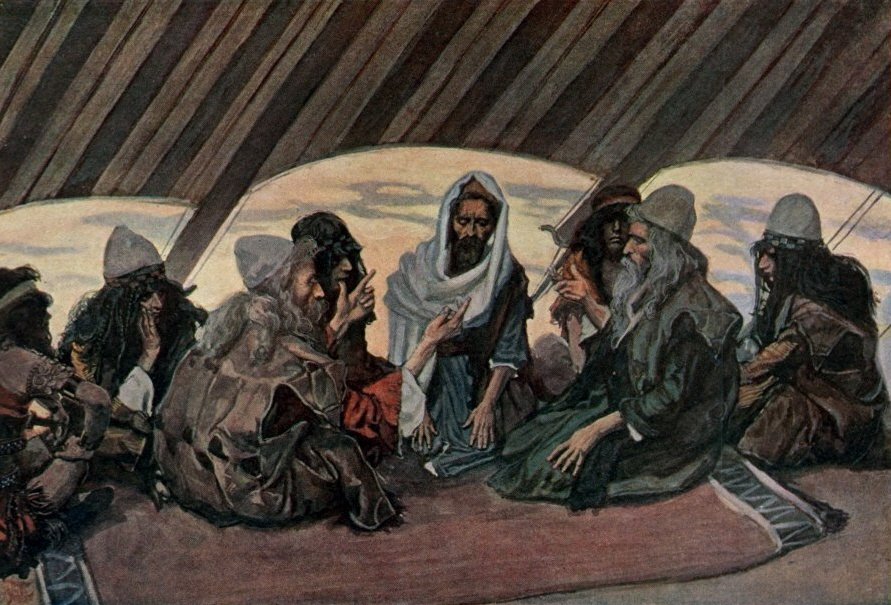The featured image is the painting Jethro and Moses, a watercolor circa 1900 by James Tissot
We’re free! We did it!
No, I’m not talking about the Eagles beating the Chiefs.
Last week we crossed the Sea of Reeds and found freedom on a distant shore. We’re heading to Sinai. But in between Egypt and Sinai where we receive Torah, we have to pass through the world of Yitro, Moses’ Midianite father-in-law.
Who was Yitro? He was a mysterious person with seven different names. But what’s in a name, a rose by any other name and all that, right? Well, each of his names illustrated a different aspect of his personality. His two main names are connected with a root that means “additional” – he was “Yitro” because he performed good deeds and “Yeter” because he caused extra texts to enter the Torah.
He was “Chovav” because he was beloved of God, “Re’u’el” because he was God’s friend, “Chever” because he was a close associate of the Almighty, “Puti’el” because he abandoned idolatry, and “Keni” because he was zealous for God.
He enters our story by listening, not speaking. This is his first lesson, that we must take the time not only to hear but to listen. Our text simply states, “Jethro, priest of Midian, Moses’ father-in-law, heard all that God had done for Moses and for Israel, God’s people, how יהוה had brought Israel out from Egypt.” (Ex. 18:1). So the rabbis were puzzled by this and wanted to know, “What exactly did Yitro hear?”
Some thought it was the giving of Torah. A few rabbis thought it was the war with Amalek. Others thought the splitting of the sea. And besides, where exactly was he when he heard all that God had done?
The Midrash tells that at the time that the Torah was given, all the kings of the world trembled and shook before the Glory of Hashem in his palace. They assembled around their greatest prophet, Bilaam, because they were afraid that another flood was coming to wipe them out.
“Fools,” he said. “There was a promise of no more floods.”
“What about a flood of fire?” they asked.
“He promised not to destroy us again. Today, Torah is being given. The power, the oz, of Torah is granted by God to Israel.”
This is what we mean by the verse we often say at the end of services, “Adonai oz l’amo yitein.” Not that God gives mere strength to his people, but that he gave us Torah to help us be strong. Torah is oz, strength.
Each of the kings heard this and went back to their kingdoms dejected, realizing for the first time that they were nothing, they had nothing, and would never amount to anything in comparison to Torah.
But. One person stayed. Yitro.
He heard this news and rather than run back to Midian, he drew closer to Hashem and the Israelite people.
He heard, but he had listened.
Our second lesson from Yitro is to be among those who stay. Have courage. Draw near.
The day that Torah was given was a day so profound, so deep, we can never fully grasp what happened. We can only imagine the lightning, thunder, and sheer power that was revealed on Sinai. The Israelites were terrified. Our rabbis had to reach into midrash and metaphor to understand what happened.
One midrash that refers to the giving of Torah is an interpretation of Song of Songs 3:11 which reads:
O maidens of Zion, go forth
Song of Songs, 3:11
And gaze upon King Solomon
Wearing the crown that his mother
Gave him on his wedding day,
On his day of bliss.
Rabbi Yochanan taught that the day of his wedding was the giving of Torah, in part because the rabbis looked through the entire Bible and could find no other reference to a crown of Solomon.
But if that is the case, to follow the metaphor, then how are we—Israel—God’s mother? That sounds shocking and even heretical.
Stay with me.
In Psalm 45:10, Israel is referred to as God’s beloved daughter. A daughter is easy to understand. She is an extension of the parent, a faithful inheritor and transmitter.
Every other nation rejected Torah. The nations of the world fell into idolatry. But our task was set: to reveal, carry on, convey, and emulate the Holy One of Blessing through His Torah. As such, we are his beloved daughter.
And yet, in Song of Songs 5:2, Israel is called God’s sister. The rabbis understand the word “Achoti” here to be a twin sister. Obviously, we cannot be compared to Hashem in any way, shape, or form, but what the rabbis taught through this twinning was that WE are the only way that God is revealed in the world. To the extent that we reveal him, he is revealed.
The rabbis teach that we are Hashem’s twin in that God enters the world through our actions. Abraham showed chesed, lovingkindness, and God’s chesed came into the world for the first time. Isaac acted with g’vurah, strength, and God’s g’vurah became manifest in the world.
It is only through us that God is revealed in the world. When we do a mitzvah, we let God into the world and open a place for Him. When we say a bracha, we are letting God in. This may surprise you. In Judaism, we are not merely pawns upon whom God acts, we are active and not passive. We are also acting upon God.
At the end of the month we will reach Shabbat Shekalim, the sabbath where every Jewish man was reminded to donate a ½ shekel to help upkeep the Temple. Later, this money was given to help prepare gifts for the poor at Purim. So why only a ½ shekel? Seems strange, right?
Rav Moshe Weinberger brings down the teaching that God is the other half. What we do in this world reveals the other ½. Hashem is once again waiting for us to bring him into our world.
What Yitro understood that the other Kings did not was that the entire universe changed with the giving of Torah. It was a new world. What they had was nothing. What the nations of the world have today is nothing. Their wives, their robes, palaces and stables. Their cars. Their houses. Their yachts. Even if they have billions of dollars. Yes, even if they own social media empires. All they thought important then and now evaporated when the King of Glory and His Torah entered the world. And God’s OZ, God’s strength, is now ours.
We are the mother who nurses God through our deeds and actions and brings His power into the world.
You do not realize your power as a Jew. We say a prayer and maybe think, “oh that’s nice I like that tune.” We say a bracha, maybe you think, “oh, this is lovely.” We hear these and then we go home—to our kingdom, to our home—and we take no action. But when we listen, when prayer inspires action, then we are like Yitro.
It’s time for each of us to be a Yitro.
He alone listened and realized that nothing else outside of Torah has meaning or value, and he ran to convert. We are called to go from smallness to greatness, tzena urena— to go out and see.
May each of us hear—and listen.
Through listening and understanding, may we know and act in ways that allow the Holy One of Blessing to be revealed in our lives.

